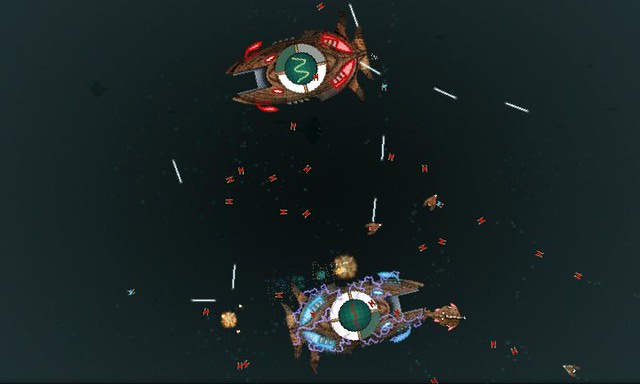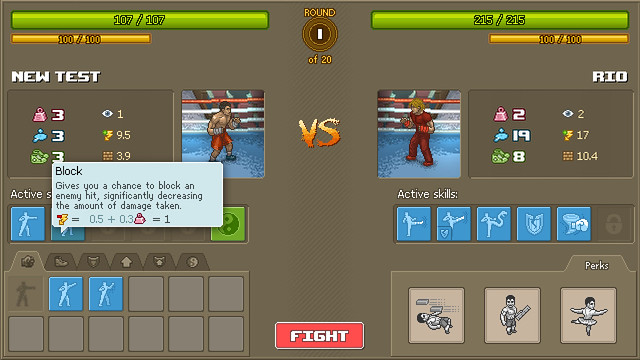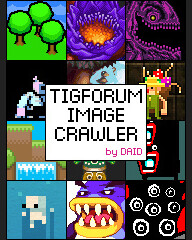Posts from ‘Casual’ Category
Punch Club
By: Derek Yu
On: February 24th, 2016
The Rocky Balboa-esque boxing theme and pixel art are what got me to try out Punch Club, a management game from Lazy Bear Studios. On the surface, the idea of moving direct control away from the fighting seems like a bad one, but it’s satisfying to see your training pay off as your character punches, kicks, and blocks on his own. Outside the ring, it’s all about efficient management of time and money – you want to spend each day training and sparring to improve your chances of winning, but your character also has to buy food and gym membership, which means taking on construction and pizza delivery jobs to make ends meet. Making things more difficult is the fact that your three main stats – strength, agility, and stamina – actually drop a little bit at the end of each day. Just like in real life, it takes sustained work to keep your physique in good shape.
The biggest problem with Punch Club is the skill system. When I played the game, its three main build paths were very imbalanced. Initially, I went with a strength build, called the Way of the Bear, and found halfway through that I had hit a wall against the agile opponents whom the game heavily favors. The intent behind strength characters is that they get fewer opportunities to punch, but can end matches quickly if they can string some hits together. In practice, unless your agility stat is comparable to your opponent’s, you probably won’t land a hit at all. The Way of the Tiger, on the other hand, allows you to focus solely on agility and a little bit of stamina, learning counterattacks that use your opponent’s strength against them. The supposed weakness of agility – damage potential – ends up not feeling like a handicap at all. And the stamina-focused Way of the Turtle is apparently even harder to succeed with than Bear.
It’s a shame, because the interplay between the resource management and fighting works well fundamentally. If you were given more interesting and well-balanced choices in terms of designing your character and his (or even her?) story, it could have found a permanent home on my phone (where I think this game is best-suited). As it is, one time through is enough for me.
The Dream Machine
By: Derek Yu
On: May 20th, 2012
The Dream Machine is an episodic horror adventure game that stars Victor Neff, a young man who just moved into an apartment with his wife. The first three chapters of the five chapter story have already come out and are now available on Steam. With each short chapter costing $5, it really makes the most sense to try chapter one for free at the game’s website and then buy the full $15 bundle on Steam if you enjoy it.
Confusing distribution options aside, The Dream Machine has a wonderfully eerie and surrealistic atmosphere, and when I played it a year or so back, I remember the story and puzzles being quite interesting. Hopefully the final two chapters will be released soon.
Wonderputt
By: Derek Yu
On: August 19th, 2011
What you see above is the entire 18-hole minigolf course that you play through in Wonderputt, a whimsical new casual game from Damp Gnat. The animation and audio matches the quality of that static screen – it’s lovely. The ball-handling is nothing to sniff at, either!
Check out Wonderputt’s development log for some interesting work-in-progress screenshots and concept art.
TIGdb: Entry for Wonderputt
Legend of Fae
By: Lorne Whiting
On: July 29th, 2011
Legend of Fae, by indie duo Endless Fluff, was recently added to Steam. The game is a charming mix of the Match-3 and RPG genres: the player switches between the two, using magic they’ve gathered in the puzzle mode to attack in the RPG mode. It’s pretty tame at first, but battles get frantic in the second half of the game and the mechanics start to really shine. The game is easily worth the 10 dollar price tag; by the end I’d say it was the best Match-3 game I’ve played. There’s just not much interest for the rather lengthy introductory segment of the the game.
Although the demo for the game is strangely absent from Steam’s store page, you can still nab it from the developer’s website.
Pax Britannica ported to Android, Still Free
By: Alehkhs
On: July 1st, 2011
 No Fun Games’ one-button RTS, Pax Britannica, has been ported to Android. This port supports 2-player battles on the same device, or against an AI player if you’re by yourself. Like it’s computer (Win/Mac/Linux) counterpart, Pax Britannica for Android sports beautiful pixel graphics and easy-to-learn gameplay, as well as a price tag of ‘free.’
No Fun Games’ one-button RTS, Pax Britannica, has been ported to Android. This port supports 2-player battles on the same device, or against an AI player if you’re by yourself. Like it’s computer (Win/Mac/Linux) counterpart, Pax Britannica for Android sports beautiful pixel graphics and easy-to-learn gameplay, as well as a price tag of ‘free.’
Game’s Site
Android Marketplace
(Source: IndieGames.com)
Proun
By: Derek Yu
On: June 23rd, 2011
Joost van Dongen’s gorgeous abstract racing game Proun has been released today as pay-what-you want. Players are encouraged the try the full game for free if they’re unsure and pay for it later if they feel that it’s worth some dough (I definitely think so!). Proun features 4 tracks (plus one bonus track when you pay for the game), up to 4-player splitscreen multiplayer, 4 speeds, online leaderboards, and an option to race against your ghosts. Players can also create their own tracks in 3d Studio MAX and share them with others.
TIGdb: Entry for Proun
Stencyl
By: Derek Yu
On: May 31st, 2011
Stencyl is a newly-released, free game creation tool that comes with a suite of drag n’ drop editors to simplify the development and publishing of Flash games. There’s a big emphasis on collaboration – StencylForge and StencylTalk let you easily share resources and chat with other developers while you work on your project. For designers who are not so fond of drag n’ drop interfaces, there is a “code mode” for Stencyl’s game logic editor that can be used in conjunction with its simplified “design mode”.
The engine is based on Adam Saltsman’s Flixel library and it uses Box2d for physics. The logic editor is based off of the educational programming language Scratch.
Sissy’s Magical Ponycorn Adventure
By: Derek Yu
On: May 24th, 2011
Ryan Henson Creighton took his 5-year-old daughter Cassie to TOJam and together they created Sissy’s Magical Ponycorn Adventure. Such heights of adorableness are rarely encountered. You can read all about this cute collaboration here.
Rebuild
By: Derek Yu
On: May 20th, 2011
Sarah Northway’s Rebuild has racked up nearly 2.5 million plays on Kongregate, and it’s not hard to see why: the game’s zombie outbreak theme is married quite well with its city-building mechanics. Each day you can send your team out on various missions to scout, scavenge, and reclaim the city, block by block. Survivors can be recruited and trained in various roles, reducing the time and danger involved in carrying out these tasks. At night, the zombies can invade, so it’s important to bolster your defenses and leave some people (preferably soldiers) behind to guard.
It’s great fun, and there’s a lot of potential here for a sequel with more depth, more personalization, more possibilities. Thankfully, Sarah is already pursuing it! You can read about the development of Rebuild 2 here, on the blog she shares with her husband (Fantastic Contraption creator Colin Northway).
TIGdb: Entry for Rebuild







